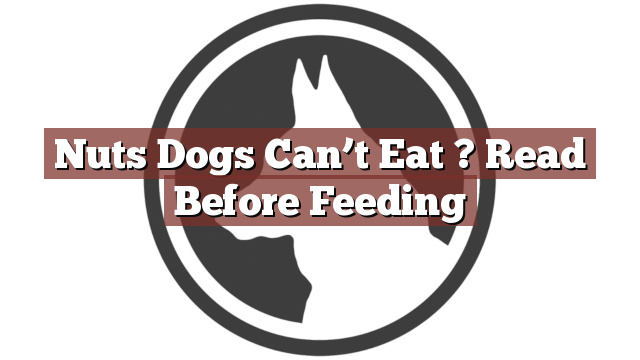Understanding Your Dog’s Dietary Needs
As a responsible dog owner, it is crucial to understand your furry friend’s dietary needs to ensure their optimal health and wellbeing. While dogs are known to be omnivorous, not all human foods are safe for them to consume. It is essential to be aware of the foods that can be harmful to dogs, including nuts.
Nuts Dogs Can’t Eat? Read Before Feeding
Nuts are a popular snack among humans, but can dogs eat them? The answer is yes and no. While some nuts are safe for dogs to consume in moderation, others can pose serious health risks. It is vital to be aware of the nuts that are unsafe for dogs to avoid any potential harm.
One example of a nut that dogs should never eat is macadamia nuts. These nuts contain a toxin that can cause severe reactions in dogs, including weakness, vomiting, and even paralysis. Other nuts that should be avoided include walnuts, pecans, and pistachios, as they can cause digestive issues or potential blockages in the intestines.
On the other hand, there are nuts that can be safe for dogs in small quantities. Peanuts are a common nut that dogs can eat, but it is important to note that some dogs may be allergic to peanuts. Cashews and almonds can also be given to dogs occasionally, but always in moderation and without any added salt, sugar, or seasonings.
Pros and Cons of Feeding Nuts to Dogs
Before deciding to feed your dog nuts, it is essential to weigh the pros and cons. While nuts can be a good source of healthy fats, protein, and vitamins for humans, they are not a necessary part of a dog’s diet. Dogs have different nutritional needs, and their regular dog food is specifically formulated to meet those needs.
One of the main concerns with feeding dogs nuts is the risk of choking or digestive issues. Nuts can be challenging for dogs to chew properly, especially if they are given whole or in large pieces. Additionally, some nuts, like almonds or pistachios, have a hard outer shell that can be difficult for dogs to break open, potentially leading to dental problems or obstructions in the digestive system.
If you do decide to offer your dog nuts as a treat, it is crucial to do so in moderation. Remember to always remove any shells, as they can pose a choking hazard or cause digestive problems. It is also essential to monitor your dog for any signs of allergies or adverse reactions and consult your veterinarian if you have any concerns.
Conclusion: Prioritize Your Dog’s Wellbeing, Avoid Feeding Nuts
While it may be tempting to share your favorite nuts with your furry companion, it is best to err on the side of caution and avoid feeding them nuts altogether. The potential risks and dangers associated with feeding certain nuts to dogs far outweigh any potential benefits. Instead, focus on providing your dog with a balanced and complete diet that meets their specific nutritional needs.
Remember, if you have any doubts or concerns about what is safe for your dog to eat, consult with your veterinarian. They can provide personalized guidance based on your dog’s breed, age, and overall health. By prioritizing your dog’s wellbeing and being knowledgeable about their dietary needs, you can ensure they lead a happy and healthy life.
Thank you for taking the time to read through our exploration of [page_title]. As every dog lover knows, our furry friends have unique dietary needs and responses, often varying from one canine to another. This is why it's paramount to approach any changes in their diet with caution and knowledge.
Before introducing any new treats or making alterations to your dog's diet based on our insights, it's crucial to consult with a veterinarian about [page_title]. Their expertise ensures that the choices you make are well-suited to your particular pet's health and well-being.
Even seemingly harmless foods can sometimes lead to allergic reactions or digestive issues, which is why monitoring your dog after introducing any new food item is essential.
The content provided here on [page_title] is crafted with care, thorough research, and a genuine love for dogs. Nevertheless, it serves as a general guideline and should not be considered a substitute for professional veterinary advice.
Always prioritize the expert insights of your veterinarian, and remember that the health and happiness of your furry companion come first.
May your journey with your pet continue to be filled with joy, love, and safe culinary adventures. Happy reading, and even happier snacking for your canine friend!

